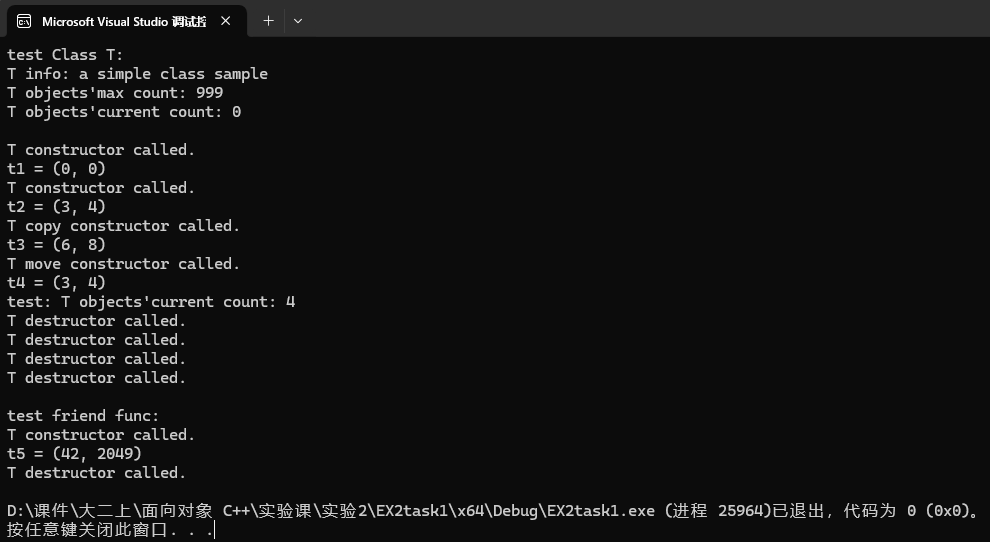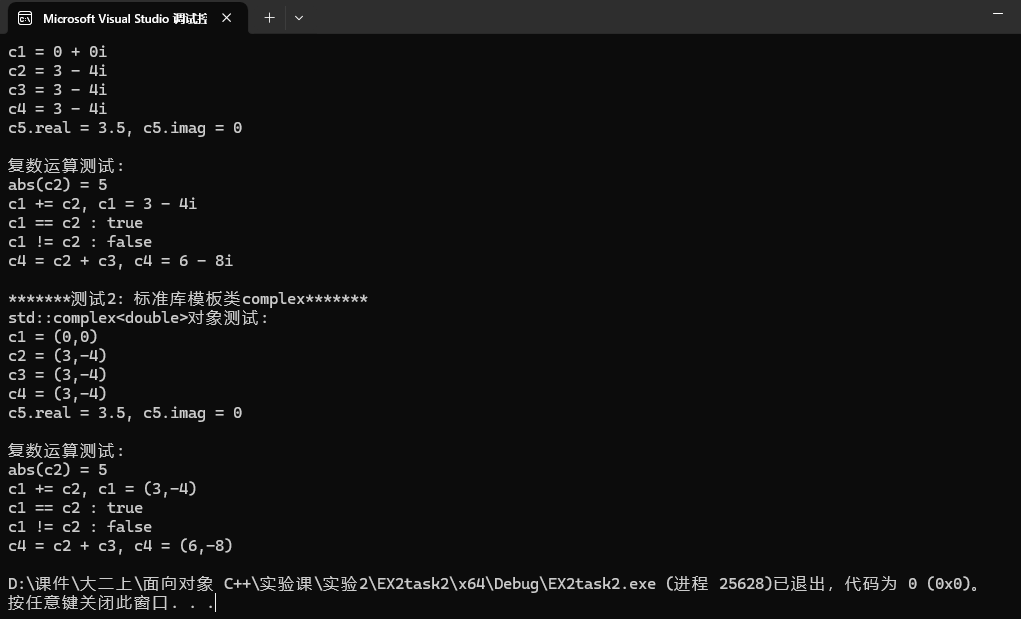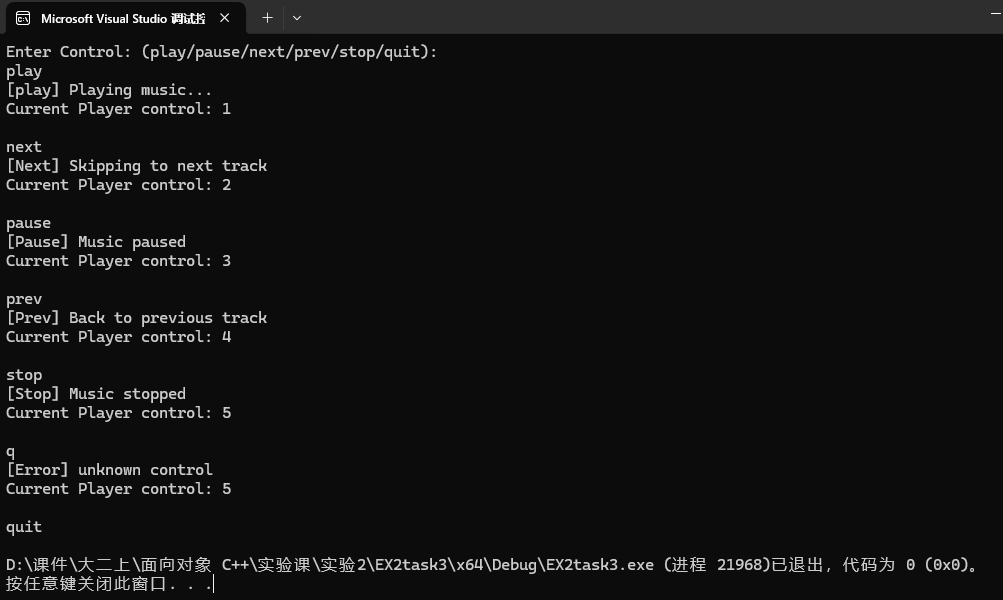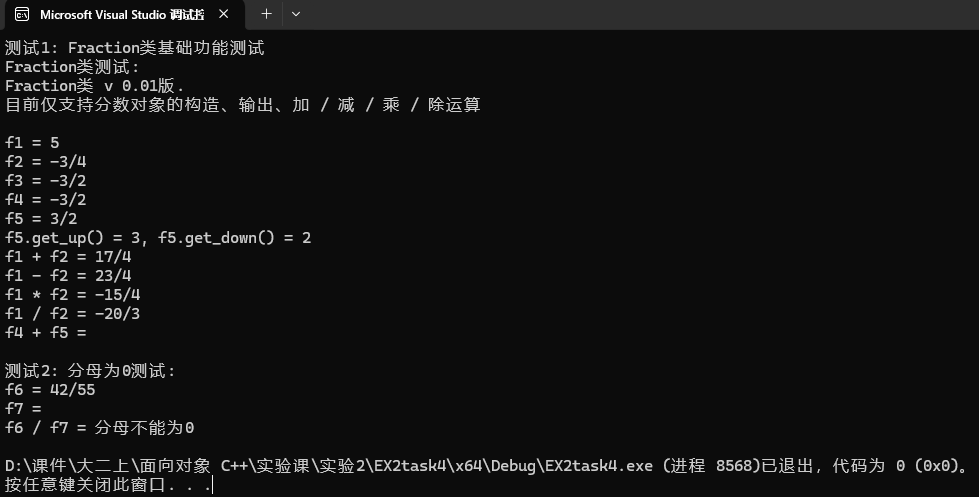实验2
Task1
源代码
T.h
#pragma once
#include <string>
// 类T: 声明
class T {
// 对象属性、方法
public:
T(int x = 0, int y = 0); // 普通构造函数
T(const T& t); // 复制构造函数
T(T&& t); // 移动构造函数
~T(); // 析构函数
void adjust(int ratio); // 按系数成倍调整数据
void display() const; // 以(m1, m2)形式显示T类对象信息
private:
int m1, m2;
// 类属性、方法
public:
static int get_cnt(); // 显示当前T类对象总数
public:
static const std::string doc; // 类T的描述信息
static const int max_cnt; // 类T对象上限
private:
static int cnt; // 当前T类对象数目
// 类T友元函数声明
friend void func();
};
// 普通函数声明
void func();
const std::string T::doc{ "a simple class sample" };
const int T::max_cnt = 999;
int T::cnt = 0;
T.cpp
#include "T.h"
#include <iostream>
#include <string>
// 类T实现
// static成员数据类外初始化
//const std::string T::doc{ "a simple class sample" };
//const int T::max_cnt = 999;
//int T::cnt = 0;
// 类方法
int T::get_cnt() {
return cnt;
}
// 对象方法
T::T(int x, int y) : m1{ x }, m2{ y } {
++cnt;
std::cout << "T constructor called.\n";
}
T::T(const T& t) : m1{ t.m1 }, m2{ t.m2 } {
++cnt;
std::cout << "T copy constructor called.\n";
}
T::T(T&& t) : m1{ t.m1 }, m2{ t.m2 } {
++cnt;
std::cout << "T move constructor called.\n";
}
T::~T() {
--cnt;
std::cout << "T destructor called.\n";
}
void T::adjust(int ratio) {
m1 *= ratio;
m2 *= ratio;
}
void T::display() const {
std::cout << "(" << m1 << ", " << m2 << ")";
}
// 普通函数实现
void func() {
T t5(42);
t5.m2 = 2049;
std::cout << "t5 = "; t5.display(); std::cout << '\n';
}
task1.cpp
#include "T.h"
#include <iostream>
void test_T();
int main() {
std::cout << "test Class T: \n";
test_T();
std::cout << "\ntest friend func: \n";
func();
}
void test_T() {
using std::cout;
using std::endl;
cout << "T info: " << T::doc << endl;
cout << "T objects'max count: " << T::max_cnt << endl;
cout << "T objects'current count: " << T::get_cnt() << endl << endl;
T t1;
cout << "t1 = "; t1.display(); cout << endl;
T t2(3, 4);
cout << "t2 = "; t2.display(); cout << endl;
T t3(t2);
t3.adjust(2);
cout << "t3 = "; t3.display(); cout << endl;
T t4(std::move(t2));
cout << "t4 = "; t4.display(); cout << endl;
cout << "test: T objects'current count: " << T::get_cnt() << endl;
}
测试结果

问题回答
(1)T.h中,在类T内部,已声明 func 是T的友元函数。在类外部,去掉line36,重新编译,程序能否正常运行。如果能,回答YES;如果不能,以截图形式提供编译报错信息,说明原因。

友元函数func在类内部声明后,需要在类外部进行声明和定义。去掉void func();后,若其他文件(如task1.cpp)中调用了func,编译器找不到func的声明,导致链接错误。
(2)T.h中,line9-12给出了各种构造函数、析构函数。总结它们各自的功能、调用时机
普通构造函数:初始化类T的对象,为成员m1、m2赋值,同时统计对象数量。当创建类T的新对象时调用。
复制构造函数:用已存在的T类对象初始化新的T类对象,复制成员m1、m2的值,同时统计对象数量。当用一个T类对象初始化另一个T类对象时调用。
移动构造函数:用右值引用的T类对象初始化新的T类对象,复制成员m1、m2的值,同时统计对象数量。当用右值T类对象初始化新T类对象时调用。
析构函数:销毁T类对象,释放资源,同时更新对象数量。当T类对象的生命周期结束时调用
(3)T.cpp中,line13-15,剪切到T.h的末尾,重新编译,程序能否正确编译。如不能,以截图形式给出报错信息,分析原因。

类的静态成员变量需要在类外进行定义性初始化,不能在头文件的类定义外部直接初始化。
Task2
源代码
Complex.h
#pragma once
#include <iostream>
#include <string>
class Complex
{
private:
double x1;
double x2;
public:
static const std::string doc;
Complex(double real = 0.0, double imag = 0.0);
Complex(const Complex &c);
double get_real() const;
double get_imag() const;
void add(const Complex& c2);
friend double output(const Complex& c);
friend double abs(const Complex& c);
friend Complex add(const Complex& c1, const Complex& c2);
friend bool is_equal(const Complex& c1, const Complex& c2);
friend bool is_not_equal(const Complex& c1, const Complex& c2);
~Complex();
};
Complex.cpp
#include "Complex.h"
#include <cmath>
const std::string Complex::doc = "a simplified complex class";
// 构造函数
Complex::Complex(double real, double imag) : x1(real), x2(imag) {}
// 拷贝构造函数
Complex::Complex(const Complex& c) : x1(c.x1), x2(c.x2) {}
double Complex::get_real() const {
return x1;
}
double Complex::get_imag() const {
return x2;
}
void Complex::add(const Complex& c2) {
x1 += c2.x1;
x2 += c2.x2;
}
double output(const Complex& c) {
if (c.x2 >= 0) {
std::cout << c.x1 << " + " << c.x2 << "i";
}
else {
std::cout << c.x1 << " - " << -c.x2 << "i";
}
return 0;
}
double abs(const Complex& c) {
return std::sqrt(c.x1 * c.x1 + c.x2 * c.x2);
}
Complex add(const Complex& c1, const Complex& c2) {
return Complex(c1.x1 + c2.x1, c1.x2 + c2.x2);
}
bool is_equal(const Complex& c1, const Complex& c2) {
return (c1.x1 == c2.x1) && (c1.x2 == c2.x2);
}
bool is_not_equal(const Complex& c1, const Complex& c2) {
return !(is_equal(c1, c2));
}
Complex::~Complex() {}
task2.cpp
#include "Complex.h"
#include <iostream>
#include <iomanip>
#include <complex>
void test_Complex();
void test_std_complex();
int main() {
std::cout << "*******测试1: 自定义类Complex*******\n";
test_Complex();
std::cout << "\n*******测试2: 标准库模板类complex*******\n";
test_std_complex();
}
void test_Complex() {
using std::cout;
using std::endl;
using std::boolalpha;
cout << "类成员测试: " << endl;
cout << Complex::doc << endl << endl;
cout << "Complex对象测试: " << endl;
Complex c1;
Complex c2(3, -4);
Complex c3(c2);
Complex c4 = c2;
const Complex c5(3.5);
cout << "c1 = "; output(c1); cout << endl;
cout << "c2 = "; output(c2); cout << endl;
cout << "c3 = "; output(c3); cout << endl;
cout << "c4 = "; output(c4); cout << endl;
cout << "c5.real = " << c5.get_real()
<< ", c5.imag = " << c5.get_imag() << endl << endl;
cout << "复数运算测试: " << endl;
cout << "abs(c2) = " << abs(c2) << endl;
c1.add(c2);
cout << "c1 += c2, c1 = "; output(c1); cout << endl;
cout << boolalpha;
cout << "c1 == c2 : " << is_equal(c1, c2) << endl;
cout << "c1 != c2 : " << is_not_equal(c1, c2) << endl;
c4 = add(c2, c3);
cout << "c4 = c2 + c3, c4 = "; output(c4); cout << endl;
}
void test_std_complex() {
using std::cout;
using std::endl;
using std::boolalpha;
cout << "std::complex<double>对象测试: " << endl;
std::complex<double> c1;
std::complex<double> c2(3, -4);
std::complex<double> c3(c2);
std::complex<double> c4 = c2;
const std::complex<double> c5(3.5);
cout << "c1 = " << c1 << endl;
cout << "c2 = " << c2 << endl;
cout << "c3 = " << c3 << endl;
cout << "c4 = " << c4 << endl;
cout << "c5.real = " << c5.real()
<< ", c5.imag = " << c5.imag() << endl << endl;
cout << "复数运算测试: " << endl;
cout << "abs(c2) = " << abs(c2) << endl;
c1 += c2;
cout << "c1 += c2, c1 = " << c1 << endl;
cout << boolalpha;
cout << "c1 == c2 : " << (c1 == c2) << endl;
cout << "c1 != c2 : " << (c1 != c2) << endl;
c4 = c2 + c3;
cout << "c4 = c2 + c3, c4 = " << c4 << endl;
}
测试结果

问题回答
(1)比较自定义类 Complex 和标准库模板类 complex 的用法,在使用形式上,哪一种更简洁?函数和运算内在有关联吗?
标准库模板类 complex更加简洁。标准库中的运算符和函数是对复数运算的封装,其内部实现了复数的加减、比较、输出、求模等操作,和自定义类中add()、is_equal()、output()、abs()等函数的功能是对应的,都是为了实现复数的相关运算和操作。
函数和运算间存在关联。
(2)
2-1 自定义 Complex 中, output/abs/add/ 等均设为友元,它们真的需要访问 私有数据 吗?(回答“是/否”并给出理由)
是。因为output()需要访问复数的实部和虚部来进行输出,add()需要访问两个复数的实部和虚部分别相加,abs()需要根据实部和虚部计算模长,这些操作都需要访问类的私有数据成员,所以需要设为友元。
2-2 标准库 std::complex 是否把 abs 设为友元?(查阅 cppreference后回答)
没有。
2-3 什么时候才考虑使用 friend?总结你的思考。
当函数需要直接访问类的私有数据成员,且该函数不是类的成员函数时,才考虑使用友元
(3)如果构造对象时禁用=形式,即遇到 Complex c4 = c2; 编译报错,类Complex的设计应如何调整?
将拷贝构造函数声明设置为私有,在Complex.h文件中修改:
private:
Complex(const Complex& other);
Task3
源代码
PlayerControl.h
#pragma once
#include <string>
enum class ControlType { Play, Pause, Next, Prev, Stop, Unknown };
class PlayerControl {
public:
PlayerControl();
ControlType parse(const std::string& control_str); // 实现std::string --> ControlType转换
void execute(ControlType cmd) const; // 执行控制操作(以打印输出模拟)
static int get_cnt();
private:
static int total_cnt;
};
PlayerControl.cpp
#include "PlayerControl.h"
#include <iostream>
#include <algorithm>
int PlayerControl::total_cnt = 0;
PlayerControl::PlayerControl() {}
// 待补足
// 1. 将输入字符串转为小写,实现大小写不敏感
// 2. 匹配"play"/"pause"/"next"/"prev"/"stop"并返回对应枚举
// 3. 未匹配的字符串返回ControlType::Unknown
// 4. 每次成功调用parse时递增total_cnt
ControlType PlayerControl::parse(const std::string& control_str) {
std::string lower_str = control_str;
std::transform(lower_str.begin(), lower_str.end(), lower_str.begin(), ::tolower);
if (lower_str == "play") {
total_cnt++;
return ControlType::Play;
}
else if (lower_str == "pause") {
total_cnt++;
return ControlType::Pause;
}
else if (lower_str == "next") {
total_cnt++;
return ControlType::Next;
}
else if (lower_str == "prev") {
total_cnt++;
return ControlType::Prev;
}
else if (lower_str == "stop") {
total_cnt++;
return ControlType::Stop;
}
return ControlType::Unknown;
}
void PlayerControl::execute(ControlType cmd) const {
switch (cmd) {
case ControlType::Play: std::cout << "[play] Playing music...\n"; break;
case ControlType::Pause: std::cout << "[Pause] Music paused\n"; break;
case ControlType::Next: std::cout << "[Next] Skipping to next track\n"; break;
case ControlType::Prev: std::cout << "[Prev] Back to previous track\n"; break;
case ControlType::Stop: std::cout << "[Stop] Music stopped\n"; break;
default: std::cout << "[Error] unknown control\n"; break;
}
}
int PlayerControl::get_cnt() {
return total_cnt;
}
task3.cpp
#include "PlayerControl.h"
#include <iostream>
void test() {
PlayerControl controller;
std::string control_str;
std::cout << "Enter Control: (play/pause/next/prev/stop/quit):\n";
while (std::cin >> control_str) {
if (control_str == "quit")
break;
ControlType cmd = controller.parse(control_str);
controller.execute(cmd);
std::cout << "Current Player control: " << PlayerControl::get_cnt() << "\n\n";
}
}
int main() {
test();
}
测试结果

问题回答
如果希望输模拟播放控制时,输出控制更现代(使用emoji),如下测试截图所示。如何调整代码实现?
找对Unicode中对应的emoji图标编码,再替换文件中[]的内容,如[play]替换成\U0001F3B5
Task4
源代码
Fraction.h
#pragma once
#include<iostream>
class Fraction
{
private:
int up; //分子 包含符号
int down; //分母
static int gcd(int a, int b) {
a = std::abs(a);
b = std::abs(b);
while (b != 0) {
int temp = b;
b = a % b;
a = temp;
}
return a;
}
void reduce() {
int common = gcd(up, down);
up /= common;
down /= common;
if (down < 0) {
up = -up;
down = -down;
}
}
public:
static const std::string doc;
Fraction(int m_up = 0, int m_down = 1);
Fraction(const Fraction& num) ;
int get_up() const;
int get_down() const;
Fraction negative() const;
};
Methods.h
#pragma once
#include "Fraction.h"
class Methods
{
public:
static Fraction add(const Fraction& a, const Fraction& b);
static Fraction sub(const Fraction& a, const Fraction& b);
static Fraction mul(const Fraction& a, const Fraction& b);
static Fraction div(const Fraction& a, const Fraction& b);
};
Fraction.cpp
#include "Fraction.h"
const std::string Fraction::doc = "Fraction类 v 0.01版. \n目前仅支持分数对象的构造、输出、加 / 减 / 乘 / 除运算";
Fraction::Fraction(int m_up, int m_down) {
if (m_down < 0) {
m_up = -m_up;
m_down = -m_down;
}
int common_divisor = gcd(m_up, m_down);
up = m_up / common_divisor;
down = m_down / common_divisor;
}
Fraction::Fraction(const Fraction& other) {
this->up = other.up;
this->down = other.down;
}
int Fraction::get_up() const {
return up;
}
int Fraction::get_down() const {
return down;
}
Fraction Fraction::negative() const {
Fraction other;
other.down = this->down;
other.up = -this->up;
return other;
}
Methods.cpp
#include "Methods.h"
Fraction Methods::add(const Fraction& a, const Fraction& b) {
int new_up = a.get_up() * b.get_down() + b.get_up() * a.get_down();
int new_down = a.get_down() * b.get_down();
return Fraction(new_up, new_down);
}
Fraction Methods::sub(const Fraction& a, const Fraction& b) {
int new_up = a.get_up() * b.get_down() - b.get_up() * a.get_down();
int new_down = a.get_down() * b.get_down();
return Fraction(new_up, new_down);
}
Fraction Methods::mul(const Fraction& a, const Fraction& b) {
int new_up = a.get_up() * b.get_up();
int new_down = a.get_down() * b.get_down();
return Fraction(new_up, new_down);
}
Fraction Methods::div(const Fraction& a, const Fraction& b) {
if (b.get_up() == 0) {
std::cout << "分母不能为0";
return Fraction(0, 2);
}
int new_up = a.get_up() * b.get_down();
int new_down = a.get_down() * b.get_up();
return Fraction(new_up, new_down);
}
task4
#include "Fraction.h"
#include "Methods.h"
#include <iostream>
#include <ratio>
void test1();
void test2();
void output(Fraction num) {
if (num.get_down() == 1 && num.get_up() == 0) {
}
else if (num.get_down() == 1) {
std::cout << num.get_up();
}
else {
std::cout << num.get_up() << "/" << num.get_down();
}
}
int main() {
std::cout << "测试1: Fraction类基础功能测试\n";
test1();
std::cout << "\n测试2: 分母为0测试: \n";
test2();
}
void test1() {
using std::cout;
using std::endl;
cout << "Fraction类测试: " << endl;
cout << Fraction::doc << endl << endl;
Fraction f1(5);
Fraction f2(3, -4), f3(-18, 12);
Fraction f4(f3);
cout << "f1 = "; output(f1); cout << endl;
cout << "f2 = "; output(f2); cout << endl;
cout << "f3 = "; output(f3); cout << endl;
cout << "f4 = "; output(f4); cout << endl;
const Fraction f5(f4.negative());
cout << "f5 = "; output(f5); cout << endl;
cout << "f5.get_up() = " << f5.get_up()
<< ", f5.get_down() = " << f5.get_down() << endl;
cout << "f1 + f2 = "; output(Methods::add(f1, f2)); cout << endl;
cout << "f1 - f2 = "; output(Methods::sub(f1, f2)); cout << endl;
cout << "f1 * f2 = "; output(Methods::mul(f1, f2)); cout << endl;
cout << "f1 / f2 = "; output(Methods::div(f1, f2)); cout << endl;
cout << "f4 + f5 = "; output(Methods::add(f4, f5)); cout << endl;
}
void test2() {
using std::cout;
using std::endl;
Fraction f6(42, 55), f7(0, 3);
cout << "f6 = "; output(f6); cout << endl;
cout << "f7 = "; output(f7); cout << endl;
cout << "f6 / f7 = "; output(Methods::div(f6, f7)); cout << endl;
}
测试结果

问题回答
(1)分数的输出和计算, output/add/sub/mul/div ,你选择的是哪一种设计方案?(友元/自由函数/命名空间+自
由函数/类+static)
选择定义一个类Methods,包含加减乘除四种运算。而output()函数直接定义在task4.cpp文件中即可
(2)你的决策理由?如友元方案的优缺点、静态成员函数方案的适用场景、命名空间方案的考虑因素等。
定义一个专门的工具库(包含分数的加减乘除操作)能够更加便捷地按照名字提示找到所需要的工具




 浙公网安备 33010602011771号
浙公网安备 33010602011771号